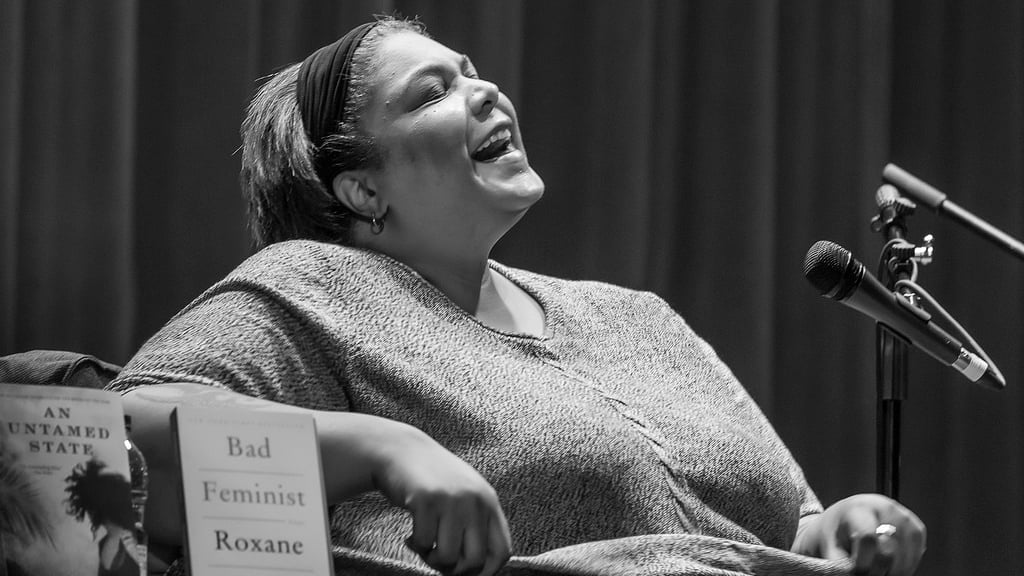At All Souls Unitarian Church in Columbia Heights Monday night, fans lined up around the block to see the author Roxane Gay discuss her latest book, Hunger, with WAMU’s editorial director, Alicia Montgomery. Here are the highlights from her candid discussion:
1. She’s writing a television show!
Gay divulged she’s writing a television pilot called “Grown Women” for Amazon, adapted from her own work. It’s still in the early stages, and being produced by musician Common‘s company in Los Angeles.
2. She says “of course” she’s watching The Bachelorette, which has its first black female lead.
Gay said while she’s excited there’s a black Bachelorette, she thinks it will be even more groundbreaking once there’s a black man cast as the Bachelor.
“It’s always weird when you’re the first black anything, that you have to be so f*cking exceptional,” Gay said. “Rachel is an attorney, she’s gorgeous, she’s charming, she’s intelligent, she’s funny–and THESE are the men?”
3. She had a stillbirth–and doctors blamed her for it.
“I’m going to ask you the question that I’m really scared to ask you,” Montgomery began, “You wrote, ‘We suffered a loss, and it undid me. I needed to blame someone, or something, so I blamed myself. I blamed my body for being broken. My doctor did not dissuade me from doing this, which was its own kind of hell.’ This is the language that a lot of women use to describe losing a baby. Is that what happened to you?”
Gay confirmed that she did indeed lost a pregnancy at 29 weeks while she was living in Michigan’s Upper Peninsula, and doctors initially blamed the stillbirth on her for being overweight (that wasn’t the cause.)
“We were really excited to have this child,” Gay said. “[After the stillbirth] I blamed myself and I thought: Well, here it is. All those years of overeating and making your body into a fortress, finally you get your Happily Ever After and now it’s time for comeuppance.”
4. She would pay “any amount” of money to find a doctor that doesn’t stigmatize her for her weight.
Gay says the combination of her race, gender, and weight make doctor visits hellish, and she avoids it unless she absolutely must go. Studies show that doctors take women’s and black people’s pain less seriously, and give obese patients worse care. She says even being famous hasn’t helped.
“It’s really frustrating that doctors take an oath first to do no harm, then that they’re supposed to treat people–and they don’t treat fat people. I could go to the doctor for a sore throat and the first thing they’ll write on my chart is ‘morbidly obese,’ Gay said. “I would pay ANY amount of money at this point in my life to have a regular physician that I could go to for medical care. I would travel anywhere in the world to do this. The fact that I haven’t been able to throw money at this problem lets you know how bad it is.”
5. Interviewers keep asking her to “describe her body” to them (and she hates it).
Gay’s book details the stigma fat people deal with moving through the world–and journalists are very uncomfortable talking to her about it.
“I knew what [the interviewer] wanted. She wanted me to break into some self-loathing recitation about how I’m this horrible gargantuan monster–which is not how I see myself,” Gay said, describing a recent interview. “She did this all in NPR voice. It got cut from the interview, but you can’t cut me! I’m going to tell that story every single time.”
Despite book tour challenges, Gay found writing Hunger to be healing.
“People say all kinds of nonsense about my body, and write all kinds of nonsense about my body, so to be able to take control of that narrative has been fantastic,” she said.
6. She said she loved growing up in the Midwest, but Indiana “broke” her
“I’m from the Midwest, I was born in Omaha, Nebraska,” said Gay. “I don’t hate the Midwest, but honestly, I’m really burnt out. Indiana broke me. It wasn’t Illinois, it wasn’t Michigan, it wasn’t Nebraska–it was Indiana. The Klan presence is just really strong there, and the Confederacy is alive. So it just got harder and harder and harder to want to be a token black girl in a place where I didn’t feel safe leaving my house.”
Gay said her neighbors are nice, but when they say “crazy shit” she doesn’t hesitate to tell them “You are saying some crazy shit.”
“For so many of us in the Midwest who are people of color, we tend to smile and grit our teeth through it. I can’t tell you how many times I’ve smiled my way through racism simply because they mean well,” Gay said. “But they don’t mean well, and they don’t even know they don’t mean well.”
7. Gay loves Beyoncé’s “Hold Up” so much she reenacted it with a broomstick and trash bags.
Gay says she never considered writing about her traumatic experiences then refusing interviews about it a la Beyoncé and her album Lemonade, because “I’m not Beyoncé.” The song that spoke to her the most while writing was Hold Up.
“It was the first video where I started to reenact it. I would just wear a trash bag and pretend it was a dress and wave a broom stick–I live alone most of the time,” Gay cracked. “I thought if Beyoncé can go back with Jay-Z, I can go back and finish this book.”
This event was put on by the DC Public Library as part of their Signature Speaker Series.



















